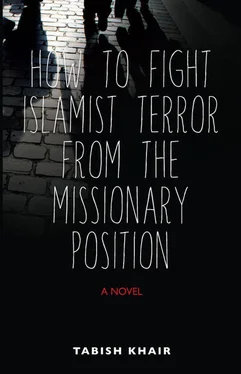But it was true. Facts, fiction, languages did not flock to me, without significant effort on my part. They did to Ravi. They were like the “plain” women he dated—some of whom were plain only by the standards of a man who had grown up among Bollywood starlets. But flock to him they did, despite what Ravi called his “absolute honesty”: the fact that he made no promise of fidelity, that he actually promised infidelity and impermanence. I am a postmodern lover, he would clarify; you, bastard, are still stuck knee-deep in modernity.
When I returned to the flat that evening, there were sounds coming from Ravi’s room. The rhythm of love-making, communicated by the creaking of his bed, which soon swelled to an unrestrained crescendo of ecstasy in a male and a female voice. I was becoming familiar with these noises, and wondered what Karim Bhai thought of them. There was no sign of Karim Bhai, but I assumed he had called or met Ravi earlier on. I shut myself up in my room with one of the last volumes of my Proust.
An hour later, Ravi knocked on my door, opened it and did a fair imitation of a siren blowing. All clear, bastard, he announced. Let’s get a pizza.
Over the pizza, he asked me if Karim Bhai had come back and left again during his moments of ecstasy.
“But I thought you had heard from him,” I said.
“No. There was no sign of him.” We were somewhat worried.
“Should we call and ask?” wondered Ravi. We had exchanged mobile numbers on moving in. But we decided not to call; it appeared a bit excessive, given the phlegmaticism with which Karim mostly treated events and things.
This was our first month in the flat, and Karim had always appeared to be such a careful, methodical man: we could not help worrying. We were about to call him when, at about nine that night, we heard his cab pull up. Karim Bhai came in and went into his room. He usually kept the door of his room slightly open, even at night, but tonight he closed it firmly. Next morning, he remained reticent about his disappearance, and we saw no cause to press him for information.
In later months, we would get used to such sudden disappearances by Karim Bhai. We would not pay it much attention, perhaps even attributing it to the kind of carnal needs that we indulged in, Ravi with far greater abundance than me, and that Karim Bhai appeared to be so unaffected by. Perhaps, I remember thinking, he needs a day or a night out with some prostitute. It made sense to me: I could not imagine a man to whom sex did not matter.
Later on, when the controversy broke over us, we started pondering more about these mysterious disappearances of Karim Bhai. They came to be colored the shade of suspicion that was being cast on all of us by the Danish tabloids. But that was still almost a year off; I should stick to the forgotten injunctions of my girlfriend of yore and keep that story for later. Too much movement back and forth in time, I almost remember her quoting her MFA professor, loses more readers than it gains.
Ravi, who could have easily got a role as a star in any Bollywood film on the basis of his looks alone—not to mention the contacts that his surgeon father and his socialite-actress mother had in that city of connections—never dated girls he did not consider “plain.” He had a theory about it, which he had explained many times to me (and once, to her great irritation, to my ex-wife). One evening, with the February Århus sky blanketing all desire to go out, he explained it to Karim. We had been drinking gin—Ravi and I, that is—in his room, where he had installed a small bar with a fridge. While my room was filled with Ikea furniture and Karim’s with secondhand stuff bought over a number of years, Ravi’s room had an expensive four-poster bed, a small ivory-topped table, a revolving Victorian book rack, and this bar, leaving just enough space to walk from the door to the window at the other end.
Despite his legendary spat with his father, Ravi’s mother still sent him hundred-dollar bills in unregistered envelopes—something Karim Bhai was shocked at, for he was afraid the money would be lost in transit and did not realize how small these sums were for Ravi’s family. Consequently, Ravi usually had more money than he needed. The bar had been purchased to enable us to drink in his room when Karim Bhai was around. When Karim Bhai was in the flat, for some reason, even though he never forbade it, we never took a drink into the kitchen. We never even entered Karim Bhai’s room if we had been drinking, but we would sometimes go to the kitchen for a coffee, and then Karim Bhai, if he was around, joined us and pretended not to notice our slightly inebriated state.
“You see, Karim Bhai,” Ravi said that evening in the kitchen, more drunk than usual, “plain girls are the salt of the earth: they do things to you. Beautiful girls expect you to do things to them.”
“Do things for you?” Karim Bhai corrected him hesitatingly. He had just handed Ravi one of his carefully rolled cigarettes, after I had declined.
“No, Karim Bhai. To you. You know, they do things to you. They do not just lie under you or straddle you and expect their beauty to do all their work for them. If you want real sex, Karim Bhai, you know, the stuff that sends the world whirring for a minute like a ceiling fan, go for the plain women of the world.”
Karim Bhai was already blushing behind his beard. He had the pink complexion of some north Indian men, as did Ravi. I am much darker, and Ravi had on occasions pointed out, given his ironic penchant for stereotypes, that the two of them, despite being “bloody Indians,” would pass for any “frontier Pashtun,” while I, being “a bloody Paki,” disgraced my nationality and looked like a “darkie Hindoo.” That’s because, Ravi would add, this bastard is not a real Paki; he is a fucking mohajir.
That is true. My grandparents had left India with their children during the partition years. I sometimes meet mohajirs in Pakistan who wax eloquent about all they lost in India and lament the partition. In my case, I am grateful to Jinnah, Patel, Nehru, Mountbatten, Lady and Lord, whoever it was that fucked up in 1947 and sent millions of people to their graves or across invisible borders. Huge tragedy, sure, don’t misread me; but in my case, only good came out of it. I once, just once, visited the town—home, they called it until their death—that my grandparents had left in India. It was a desolate, dingy, dry little landlocked place called Phansa in Bihar. I returned to lovely, vibrant, seaside Karachi, relieved to be a mohajir. Since then, I have always been thankful to the whole blind bickering gang of them for their fuck-ups in 1947.
Ravi was blind to Karim Bhai’s blush. When Ravi got going on his theories, especially if he was a bit drunk, he seldom noticed their effects. All of Our Forcibly Shared Great Western Civilization, he once explained, is evidence of the fact that great men are never aware of the effects of their theories on others.
What Ravi claimed was not entirely true. Not all of Ravi’s “plain” girls did things “to” him. He himself divided them up into those with whom he had a Platonic relationship, those with whom he had a Gandhian relationship and those who joined him in a Marxist relationship. The Platonic ones were to contemplate and forget; the Gandhian ones were to fumble with, to hug and huddle, but nothing more; the Marxist ones were, as he put it, to screw and get screwed by.
Why Marxist, I had questioned him, for I considered myself more or less a Marxist.
“Because Marx had an illegitimate daughter, O Ignorant Son of the Bourgeoisie, because Engels had a series of mistresses, and, above all, because, as any True Marxist will tell you, history is merely the progress of the classes fucking each other up,” he had explained on that occasion.
Читать дальше












